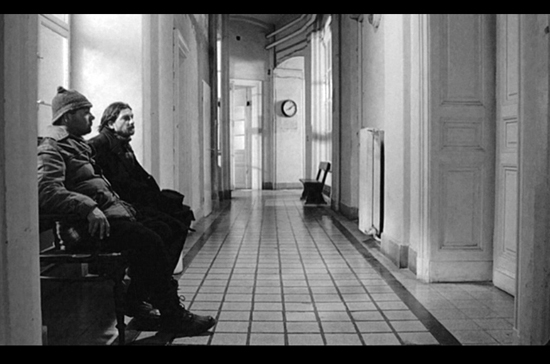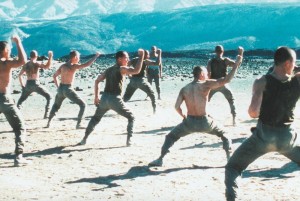From the March 6, 2000 Chicago Reader. — J.R.

I seem to be in a distinct minority in regarding Brian De Palma as a tacky blowhard and unimaginative plagiarist — Pauline Kael places him above Alfred Hitchcock, who she apparently feels lacked the proper trashy exuberance, and the editors of Cahiers du Cinema recently concluded that Carlito’s Way was the greatest film of the 90s. But if I had to select a recent De Palma movie that validated my own bias, I’d opt for this ludicrous compost of derivative SF and insincere soap opera, which begins with a spaceship pilfered from 2001, ends with a New Age epiphany out of Close Encounters of the Third Kind, and features a lot of bad acting and celestial choirs in between. Jim Thomas, John Thomas, Graham Yost, and Lowell Cannon are credited with the clumsy script, and the teary-eyed actors include Gary Sinise, Tim Robbins, Connie Nielsen, Don Cheadle, and Jerry O’Connell. There are a few pretty good design effects en route, but not enough to compensate for all the embarrassments. 120 min. (JR)
 Read more
Read more
From In These Times (March 31, 1997). Some of the material here wound up in my book Movie Wars, published in 2000. -– J.R.

There’s a new kind of factoid at large in this country on the subject of foreign films. At a time when Americans have retreated into cultural insularity and isolationism as seldom before, one repeatedly hears the same list of reasons for foreign films’ near invisibility in this country: The quality of world cinema is at an all-time low; Americans can no longer bear to sit through movies with subtitles; Americans went to European movies in the past only in order to see bare skin, and ever since American movies became sexually explicit, this market has drastically dwindled; and there are no exciting new movements in world cinema to compare with Italian neorealism, the French New Wave, Brazilian cinema novo or the new German cinema. That none of these claims (with the arguable exception of the second) is even remotely true shouldn’t be too surprising, because the “experts” who give voice to them typically define their expertise institutionally:
If the statement is being made in the New York Times, Esquire or The New Yorker, then it must have some factual basis. Read more
From the June 2, 2000 Chicago Reader. — J.R.

A gorgeous mirage of a movie, Claire Denis’ reverie about the French foreign legion in eastern Africa (1999, 90 min.), suggested by Herman Melville’s Billy Budd, Foretopman, benefits especially from having been choreographed (by Bernardo Montet, who also plays one of the legionnaires). Combined with Denis’ superb eye for settings, Agnes Godard’s cinematography, and the director’s decision to treat major and minor elements as equally important, this turns some of the military maneuvers and exercises into thrilling pieces of filmmaking that surpass even Full Metal Jacket and converts some sequences in a disco into vibrant punctuations. The story, which drifts by in memory fragments, is told from the perspective of a solitary former sergeant (Denis Lavant, star of The Lovers on the Bridge) now living in Marseilles and recalling his hatred for a popular recruit (Gregoire Colin) that led to the sergeant’s discharge; the fact that his superior is named after the hero of Godard’s Le petit soldat and played by the same actor almost 40 years later (Michel Subor) adds a suggestive thread, as do the passages from Benjamin Britten’s opera Billy Budd. Most of all, Denis, who spent part of her childhood in Djibouti, captures the poetry and atmosphere — and, more subtly, the women — of Africa like few filmmakers before her. Read more




